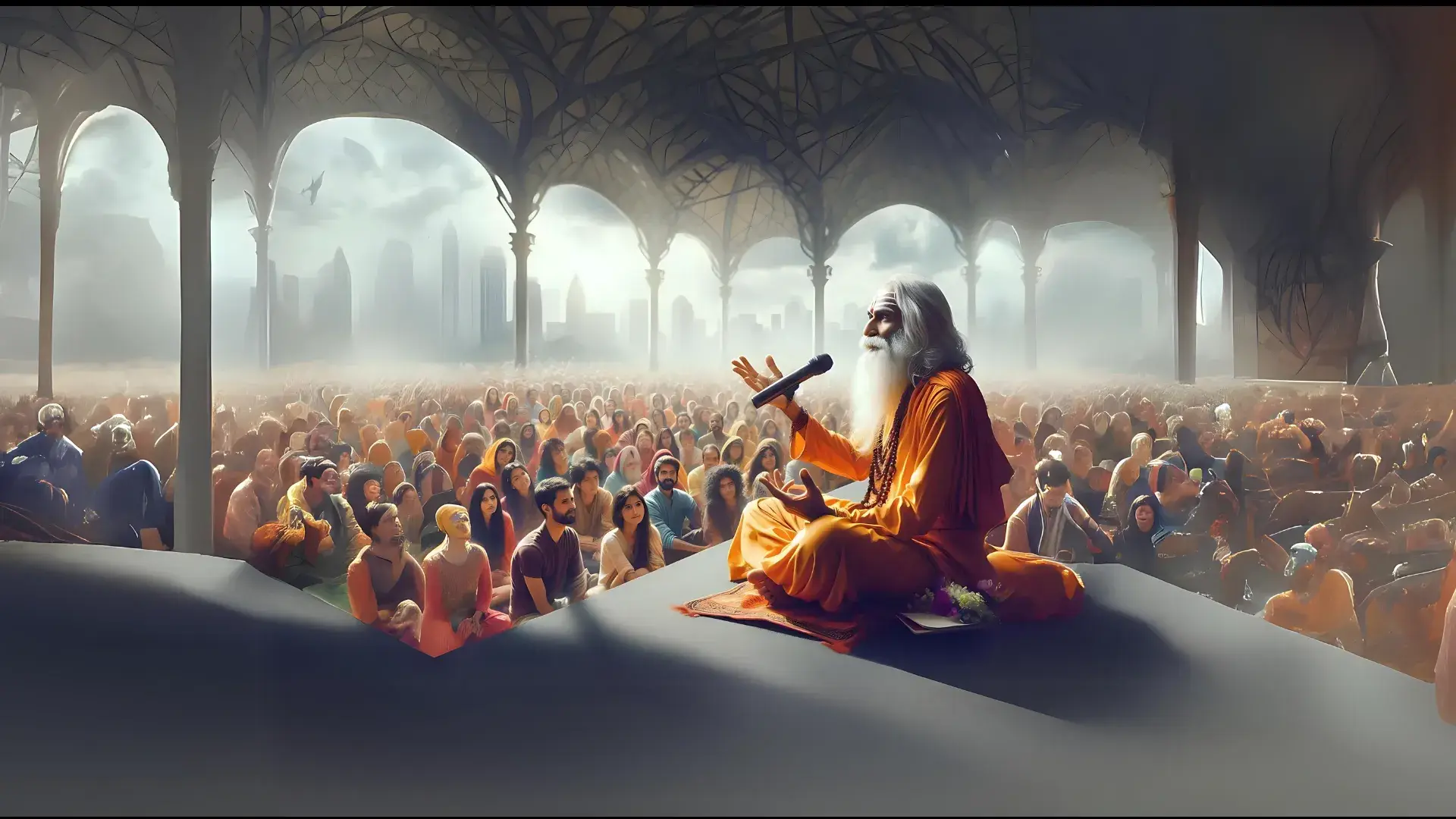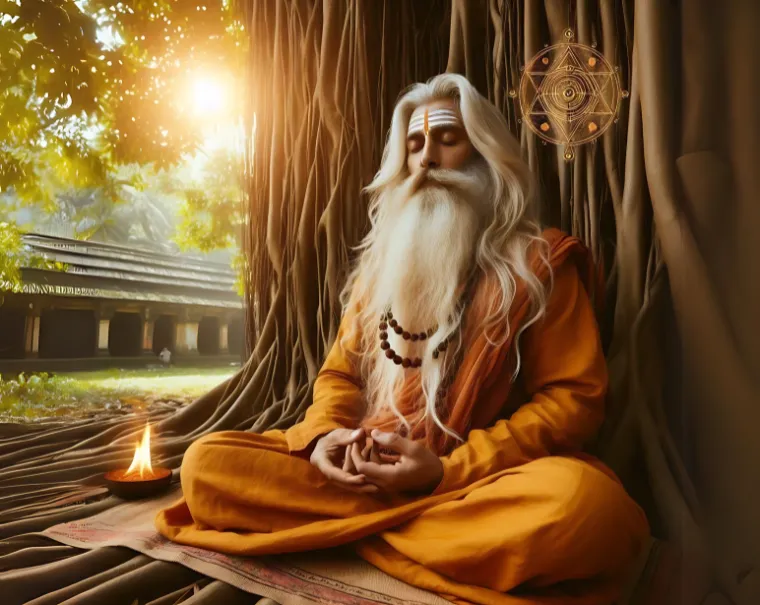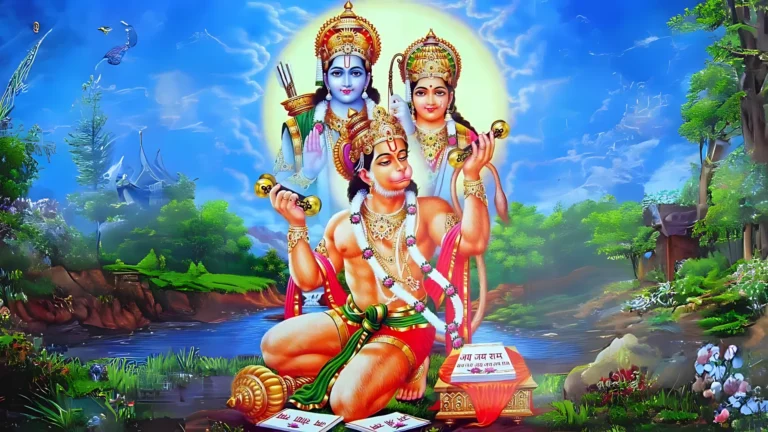Please Like the Blog and Share it for Maximum Reach
Table of Contents
7 Highlights of How Vedic Scriptures Address Us
- World’s Perfection Across Ages: The Vedic Scriptures affirm that the world remains perfect through all ages, from the Golden to the Iron Age, as it follows divine order.
- Karmic Balance: The universal law of karma ensures actions and consequences are counterbalanced, maintaining harmony in the cosmos.
- Societal Consciousness: The collective moral and spiritual state of society influences the events and conditions of each era.
- Role of Yogis: Yogis and sages silently sustain spiritual balance in the world through their presence, sadhana, and alignment with divine will.
- Divine Vision: Only those aligned with spirituality and higher consciousness can perceive the hidden perfection in the world’s workings.
- Self-Sufficiency: The world is self-sustaining and runs perfectly according to divine laws without needing human intervention.
- Eternal Laws: The timeless principles of Sanatana Dharma govern the universe, ensuring order and balance across all ages.
The Perfect World According to Vedic Scriptures
We live in a perfect world, so say the Vedic Scriptures. Irrespective of the ages, the Golden age, the Silver age, the Bronze Age, or the current Iron Age, there is nothing less than perfection in the state of affairs of the world.
This statement may seem ridiculous or even outrageous to most people. How can the Golden age and Iron age be equally perfect? This can be a valid question to ask. The answer is a little deep and perhaps intuitive, which may not be evident at first glance. The aspect of social consciousness, the aspect of collective and global consciousness has the answers.
Understanding Perfection in Different Ages
In a perfect world, things have to run the way they are meant to be. In the Golden age, there were rapes, but not so much as in the Iron Age. There were thefts and robbery but not so much as in the current age.
There may have been gross misconducts during the olden days but nothing compared to the current age. So all the negativities appear to be too many in the current age compared to the olden days.
The number of good and sacred people in the current age is negligible compared to fraudsters these days. In the olden days, it was quite the contrary. Then how do the Vedic texts proclaim that, nevertheless, the world is perfect and will continue to be? For this reason, one has to look at the whole situation intuitively.
The Law of Karma and Its Implications
The law of Karma is universal. When man goes against divine, spiritual laws, there shall be a downfall in morality; this is universal. Everything in the cosmos works according to this law, and hence actions and reactions are counter-balanced.
That is why the world is still functioning. If we go against the environment, Nature produces famine, floods, or earthquakes. When someone cheats the other person, although other beings are unable to witness what is actually happening to the one who cheats, he does get punished severely by nature.
If social consciousness is falling, society gets punished in the way that divinity chooses.
The Role of Yogis and Sages in Society
Even in this current fallen age, yogis and sages appear on the earthly platform and maintain the balance in society, through their sadhana or spiritual discipline, through their very presence.
The world, although undergoing flux, apparently in the negative direction today, is balanced by good developments. However, these developments are only visible to the ones who are aligned with the divine.
That is why people who are not aligned with the divine and do not follow the scriptures see themselves wallowing in darkness. When the levels of conduct fall, divine laws come into action.
Divine Management of the Universe
The thing to be seen is that the world is still managed, protected, and maintained by the Divine. No man is in control of the workings of the universe. The common man does not have the vision to see that the world “is” perfect and shall continue to be.
This statement is universal and cannot be challenged. This statement can be seen in action only by those who have divine vision, the result of aligning with the Supreme. Hence, the Vedic Scriptures stand as the embodiment of the Truth.
The Self-Sufficiency of the World
The world shall run and run well, irrespective of good or bad people, irrespective of good or bad events, irrespective of good or bad population. This is a fact.
Under these circumstances, it is important to understand that the world requires no savior. The world shall exist based on the eternal law (Sanatana Dharma) and the will of the Supreme. This is an undeniable fact.
Although the world is perfect and shall run well on its own accord, it becomes important for one to cultivate divinity, which is already latent in one’s heart.
The Nature of Service
For example, when community service is done, when one helps the other or supports society through one’s services, one should realize very firmly that the world “does not need it”. The service is done for one’s own benefit, one’s own spirituality.
By serving the poor, more than the poor, it is the donor of service who is going to gain. He shall gain spiritual insight if he serves without expectation. What should be understood with perfect clarity is “Service to others is true service to one’s own soul”.
7/8 Questions from Sanatana Dharma
The scores generated in this Quiz may or may not be absolute. There may be right or wrong answers to each Question. A percentage towards 100 indicates that you are more aligned to the overall subject matter.
The Pitfalls of Preaching
When one is rendering service, if one feels that one is “helping others”, one automatically becomes unfortunate. Does the world, which is already perfect, need your contribution? This feeling that I am helping the world is one’s greatest enemy.
It destroys the possibilities for one’s heart to expand and accommodate. When one sacrifices one’s ego, one is progressing at a personal level through the expansion of one’s own consciousness.
When one extends to the world, one is not helping the world in particular, but definitely one’s own self. Community service is less about the larger world but more about the Self.
The Nature of Preaching
Today, preaching is common. But there are two sides to it. One is, of course, the positive outlook of spreading the teachings to a larger audience. However, this advantage tags along with many other disadvantages. Today, we shall have a look at five common misunderstandings, problems, and shortcomings with preachings.
The Prevalence of Preaching about God
Preaching about God is very common these days. Especially the religious institutions of Sanatana Dharma have religious preachers going around the world. However, a lot of preaching styles have crept into various aspects of the Dharma.
Rather than literally promoting Vedic Gods in the religious and Vedic traditional methods, preachers tend to adopt Abrahamic system styles of preaching. Especially in the context of Sanatana Dharma, this is not a very good preference of preaching styles. Sanatana Dharma is a system of seeking and much less, a system of preaching. This one must understand.
The Personal Nature of Sanatana Dharma
It is a personal endeavor and not necessarily a mass movement. Sanatana Dharma has many teachings, no doubt. But the profundity of the system is subjective, experiential, personal, intimate, and not one that is suitable for preaching, not the least.
What preaching can utmost do is to make the principles dogmatic, bombastic, amplified, over-the-top, and above all driven by blind faith. The preaching is influenced by the personal enigma of the preacher himself, colored by the figment of his persona and imagination.
The Ineffectiveness of Preaching
As the preaching of a particular preacher becomes more prevalent in a larger crowd, the teaching is more than lost. The substance of preaching focuses on “other” faith systems as there is a mixed audience most times!
This intermixing dilutes the rich essence of Sanatana Dharma and sounds more like a motivational talk. The moment a preacher rises to fame and popularity, he is eager to make his preaching more interesting rather than effective. He focuses on attracting the attention of people and engaging large crowds.
The Decline of True Intentions
So, he includes jokes, a flurry of personal anecdotes, personal preference-driven motives played to the galleries, and whatnot. Such decline in intention arises when fantastic fiction replaces the essence of Truth.
Sanatana Dharma is an experiential system. Hence, those who have been belabored by Maya should seriously take up Santana Dharma. A person tormented by Maya looks at spirituality as a subject and not an opportunity.
The Realization of True Seeking
So, the seeking becomes sincere as it is a necessity. On the other hand, preaching Sanatana Dharma cannot transmit even an iota of power. Seeking depends on personal deliberation through a silent organized system of a Master and Disciple relationship.
However, Dharma should be governing the guru-disciple system, where one-to-one hand-holding may be required. All this said, there is still no guarantee that the seeker shall reach the destination. Sanatana Dharma does not guarantee this. It never has.
The Nature of Transformation
Sanatana Dharma is a totally involved form of transforming the seeker. It strikes and wakes up the seeker in spurts into realization with the growing spiritual capabilities. A seeker undergoes battering by material energy either in this lifetime or earlier ones. When the Mayic force manifests in full effect, the living entity has no resort other than being born in a culture that promotes pure Vedic Dharma.
The Call of the Spirit
There are other souls who may be born in alien cultures and systems. However, they feel inclined towards Sanatana Dharma in their current bodies. They may not be influenced by any particular Guru, Acharya, or preaching but by the call of the Spirit alone.
This bent can never be initiated solely by preaching, conversion, or influence. It simply dawns like lightning that it is time to go home. This realization, the soul stumbles upon by the Will of God, also known as Grace.
The Limitations of Preaching
Now, how can preaching help in the whole process? When half-baked people who have no understanding of the principles of Dharma take up preaching, things become worse. Preaching has become a profession of attracting the crowd and nothing else. So, everything cannot be preached or explained.
The Essence of Vedic Dharma
Vedic or Sanatana Dharma is the very fountain of consciousness. Hence, no preaching or influencing can cover the core teachings or transmit its essence into people. It may have many infinite teachings. Most times, preachers do not absorb the essence of Sanatana Dharma. Only a Sadhaka can become an authentic preacher. Unless he is a sadhaka who has devoted his entire life to the adoption and understanding of the Dharma, he does not qualify as a preacher.
The Qualities of a True Preacher
Additionally, he must realize these teachings and have experiential knowledge to be able to guide people. He should possess spiritual power and the knowledge of spiritual wisdom. One can only talk about a particular subject if one has dived deep into the matter. Hence, it is of utmost importance that the preacher has had the experience of life in the pursuit of Truth.
The Conclusion: A Call for Authenticity
Preaching has its place; however, when it comes to Vedic Dharma, it should not just be another set of instructions or sermons. If we look at the traditions of Vedic scriptures, we will see that they have always been spoken by those who have earned the right to speak by embodying the truths they profess. This is a call for authenticity, depth, and above all, genuine compassion for all beings.
Please Like the Blog and Share it for Maximum Reach












